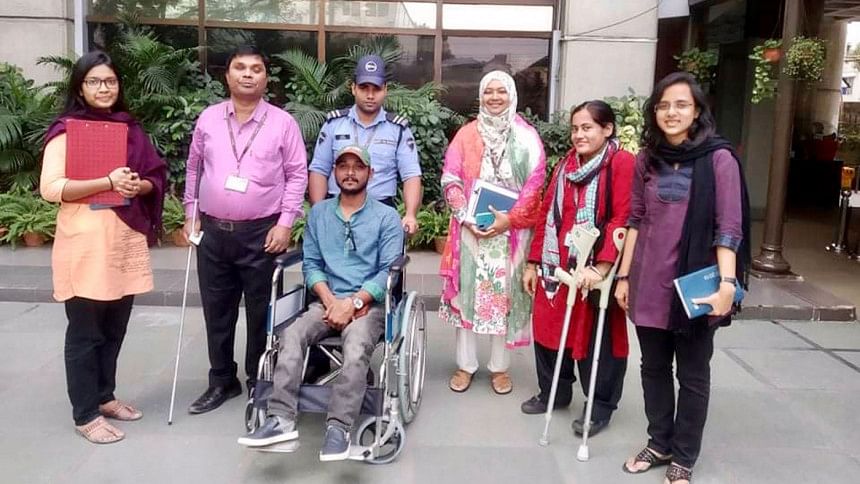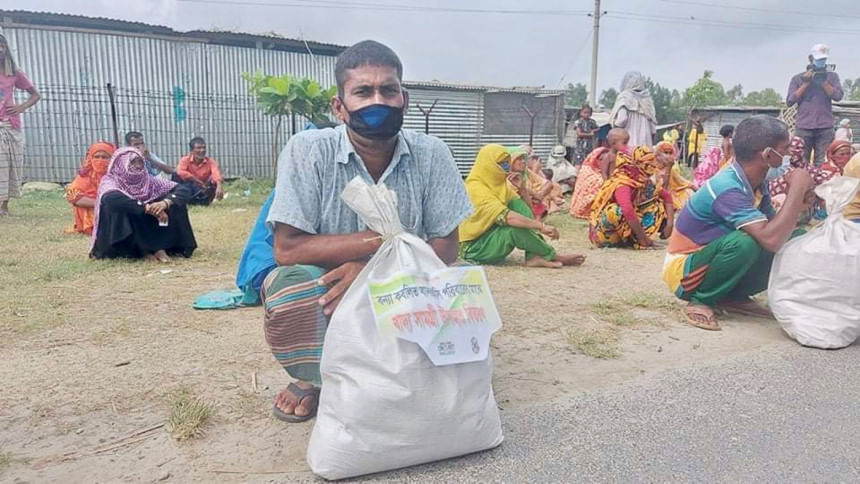Striving for a more inclusive world

Shamsin Ahmed is the founder of Identity Inclusion, an organisation working to eliminate the stigma around mental health and promote community-based support and social inclusion of people with psychosocial disabilities in Bangladesh since 2015.
After her undergraduate studies, she joined BRAC as a young professional. Through an intense year-long residential and field-based training, Shamsin graduated with the highest scores in her batch, after which she joined BRAC's Social Innovation Lab, where she worked on a disability inclusion initiative. During that time, she met Shagufe Hossain, with whom she co-founded Shammo Foundation, under which they both started their own projects on inclusion of different marginalised groups. She focused on people with psychosocial disabilities.
Identity Inclusion takes a unique approach to combat stigma by engaging and supporting families, equipping individuals, especially the youth, with the skills they need and advocating for systemic changes, while focusing on building a more inclusive society. Having watched her elder sister being excluded from schools due to her Epilepsy and Schizophrenia, Shamsin realised that exclusion is both a cause and a consequence of poor mental health. "My personal experience makes me motivated towards the cause in a profound way," she added.
Owing to her experience, she believes that inclusion is not intuitive. Rather, there is a lack of relevant services and support systems to enable different kinds of marginalised people by giving them access to mainstream platforms of representation. It is crucial to find ways to break our own prejudices.

Identity Inclusion trains undergraduate students on counselling skills, such as active listening, non-judgmental listening, active feedback, and self-care through the Department of Educational and Counselling Psychology of Dhaka University. These volunteers are then connected to families that need support with organising regular recreational activities and accompanying patients to doctor's visits, among other things.
Last year in June, the organisation registered as a consulting firm and within a year, they worked with three NGOs in Bangladesh with the motto to gain long term sustainable changes, which requires inclusive practices to be manifested in institutions. When asked about how she thinks we can build a more inclusive society for people with disabilities, Shamsin says, "We must change both people's attitudes and institutions. Our institutional policies must protect the rights of marginalised communities. We must have accountable leadership, inclusive infrastructure and organisational practices that promote and provide access to equal opportunities for all."
In 2016, Identity Inclusion, through a partnership with EMK Center, trained 100 undergraduate students of social work, development studies, and public health from four major universities of Bangladesh, on the social definition of psycho-social disability. Their project staff and volunteers were selected from these trainings, and they have been supporting the social inclusion of people with psychosocial disabilities.
"I am already a transformed person. I will never look at disability like I used to nor will I ever look at a person in a wheelchair and feel pity," says Yakub Mizan, a volunteer of the organisation. "I will feel ashamed for limiting their opportunities for who they are, robbing their dignity and not giving them the opportunity to thrive."
Till date, they have supported a child with cerebral palsy, two children with autism, a person with Schizophrenia and a girl with Epilepsy. Their volunteers have worked at the National Institute of Mental Health, which is one of the only two major mental health institutes in Bangladesh, with a capacity for 200 patients. "I envision playing a role in making an inclusive society and I am glad that I found a platform such as Identity Inclusion," says Hanan Fariyel, another volunteer.
Identity Inclusion has trained and built capacity for over 20 social and public organisations that work on disability and mental health, ranging from universities, to youth led organisations to NGOs and even police departments. After registering as a consulting firm, within a year, they developed and implemented disability inclusion strategies for BRAC and UCEP Bangladesh, where they addressed their policies, infrastructure, leadership and programmatic design and measurement for disability inclusion. Identity Inclusion was also selected to carry out online focus group discussions (FGDs) using Messenger calls, due to the Covid-19 crisis, for an organisation called Practical Action, given their experience in inclusive processes and collected data from particular marginalised groups, such madrasa students and people with disabilities.
Identity Inclusion is set to partner with Bangladesh Wheelchair Cricket Welfare Association to build a location-based accessibility app and marketplace of products and services for and by people with disabilities. Their activities also include carrying out research and advocacy work on developing a curriculum on emotional hygiene, which would be taught at different schools. Shamsin says, "We want to continue to work towards institutional changes and not just influence internal organisational policies, but also national policies in Bangladesh."
During the pandemic, they joined the Bangladesh Mental Health Network to provide free online counselling services to people as well as conducting support group meetings online. The organisation also raised funds and provided relief for 800 people affected by floods in 10 regions across the Bhramaputra-Padma banks.
Sadia Tahsin is a final year marketing major at North South University. She believes someday she will become a marketing mastermind, be able to read human minds and reveal all their secrets to the aliens. To know her secret plan, email her at [email protected].

 For all latest news, follow The Daily Star's Google News channel.
For all latest news, follow The Daily Star's Google News channel. 



Comments